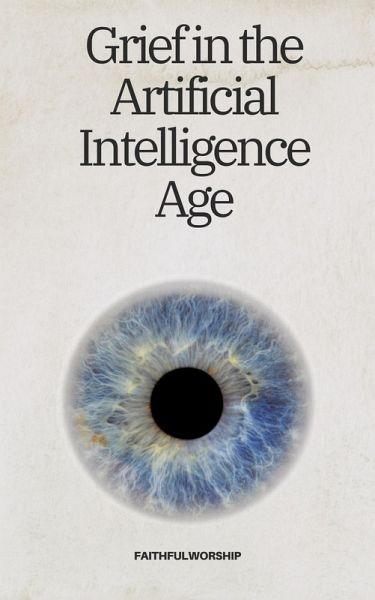
Grief in the Artificial Intelligence Age (eBook, ePUB)
Sofort per Download lieferbar
6,49 €
inkl. MwSt.

PAYBACK Punkte
0 °P sammeln!
In an era where digital technology permeates every aspect of our lives, "Grief in the Artificial Intelligence Age" offers a profound exploration of the evolving landscape of mourning and remembrance through the lens of faith. This eBook provides a comprehensive guide to understanding and navigating grief in a world increasingly influenced by digital technologies, specifically artificial intelligence, and social media.Structured into thoughtful sections, the book begins with an overview of how grief has transformed in the digital age, detailing the ways technology reshapes our traditional pract...
In an era where digital technology permeates every aspect of our lives, "Grief in the Artificial Intelligence Age" offers a profound exploration of the evolving landscape of mourning and remembrance through the lens of faith. This eBook provides a comprehensive guide to understanding and navigating grief in a world increasingly influenced by digital technologies, specifically artificial intelligence, and social media.
Structured into thoughtful sections, the book begins with an overview of how grief has transformed in the digital age, detailing the ways technology reshapes our traditional practices of mourning. It delves into the Christian perspective, offering insights on how believers can align their faith with these modern tools without losing the essence of their spiritual experiences.
The heart of the book examines the role of artificial intelligence in grief, probing into its use in personalized grief support systems, and raising pertinent ethical questions about the boundaries of AI in emotional and spiritual contexts. Additionally, it explores the impact of social media on mourning, highlighting both the therapeutic potential of sharing grief online and the privacy concerns it raises.
Online memorials, a new frontier in remembering the deceased, are discussed extensively. The text evaluates their role in Christian grieving, their benefits for legacy preservation, and theological viewpoints on digital legacies.
Virtual support groups represent another focal point, with emphasis on their growing role in providing community and solace for the bereaved in a format that transcends physical boundaries, yet raises unique challenges for authentic Christian engagement.
The book does not shy away from the challenges and ethical dilemmas posed by digital grieving. It critically assesses privacy issues, the management of digital assets, and the broader implications of technology on the authenticity of grief expressions.
Looking forward, "Grief in the Artificial Intelligence Age" forecasts the future trajectories of grief support, including the integration of emerging technologies like virtual reality and enhanced AI emotional intelligence, preparing Christians and the church for their inevitable integration.
Concluding with practical advice for Christians navigating this new reality, the book offers guidelines for using digital tools in grief support, ensuring that these advancements serve as a complement to, rather than a replacement for, traditional and spiritual mourning practices.
This eBook is an essential resource for anyone seeking to understand the intersection of grief, faith, and technology, providing crucial insights and tools to navigate this delicate terrain with grace and faithfulness.
Structured into thoughtful sections, the book begins with an overview of how grief has transformed in the digital age, detailing the ways technology reshapes our traditional practices of mourning. It delves into the Christian perspective, offering insights on how believers can align their faith with these modern tools without losing the essence of their spiritual experiences.
The heart of the book examines the role of artificial intelligence in grief, probing into its use in personalized grief support systems, and raising pertinent ethical questions about the boundaries of AI in emotional and spiritual contexts. Additionally, it explores the impact of social media on mourning, highlighting both the therapeutic potential of sharing grief online and the privacy concerns it raises.
Online memorials, a new frontier in remembering the deceased, are discussed extensively. The text evaluates their role in Christian grieving, their benefits for legacy preservation, and theological viewpoints on digital legacies.
Virtual support groups represent another focal point, with emphasis on their growing role in providing community and solace for the bereaved in a format that transcends physical boundaries, yet raises unique challenges for authentic Christian engagement.
The book does not shy away from the challenges and ethical dilemmas posed by digital grieving. It critically assesses privacy issues, the management of digital assets, and the broader implications of technology on the authenticity of grief expressions.
Looking forward, "Grief in the Artificial Intelligence Age" forecasts the future trajectories of grief support, including the integration of emerging technologies like virtual reality and enhanced AI emotional intelligence, preparing Christians and the church for their inevitable integration.
Concluding with practical advice for Christians navigating this new reality, the book offers guidelines for using digital tools in grief support, ensuring that these advancements serve as a complement to, rather than a replacement for, traditional and spiritual mourning practices.
This eBook is an essential resource for anyone seeking to understand the intersection of grief, faith, and technology, providing crucial insights and tools to navigate this delicate terrain with grace and faithfulness.
Dieser Download kann aus rechtlichen Gründen nur mit Rechnungsadresse in A, B, CY, CZ, D, DK, EW, E, FIN, F, GR, H, IRL, I, LT, L, LR, M, NL, PL, P, R, S, SLO, SK ausgeliefert werden.













